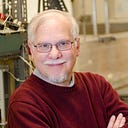The bubbles we live in
In 1986, Paul Simon sang of the “Boy in the Bubble.” The real boy in the bubble, David Vetter, suffered from severe combined immunodeficiency (SCID) and lacked immunity to infection. He lived in sterile enclosures until he died in 1984 at the age of twelve, following an unsuccessful attempt to cure him.
We all live in different bubbles, designed to keep harm out. Some of these, like family, we are consciously aware of. Others are hidden from us until outside incidents or individuals make us aware of them. In some cases, we may even reject the idea that they exist. The walls of the bubbles can block our view of what is outside them. Recent events have made me think of the many bubbles I occupy.
The first bubble is financial. My home is paid off. I outright own two cars. My sons went to small private colleges and did not have to take out loans. I just retired, with a defined benefit pension protected by the state constitution and with a guaranteed annual raise. When the pandemic eases, we should be able to vacation abroad. My home is small, my cars are old, and my pension is not huge, but by the standards of my ancestors and the vast majority of people in the world, I am a wealthy man. I am shielded by the bubble of money from the anxiety of eviction, of starvation, of poor medical care during a pandemic.
My second bubble is professional. As I wrote in my previous essay, I have a large cohort of friends and colleagues who value my contributions and welcome my presence. I move comfortably within multiple professional circles and easily take part in conferences. I retired as a tenured full professor. I do not know what it is like to be an academic nomad, scrounging a living from poorly paid jobs with no security. I am unfamiliar with being so overwhelmed with teaching that I cannot contribute scientifically. And I certainly do not know what is like to be hampered by a disability so that I cannot attend a conference or fully participate in it.
My third bubble, of course, is race. I am Jewish, and thus by the standards of all but the most abject racists, a white male. Although I have dear professional friends and colleagues who are people of color, all my close friends, those who I might invite to a wedding, are also white. I live in an integrated town, but my block is also almost exclusively white. And despite years of efforts to diversify the university, my academic colleagues include few people of color. So, it is impossible for me to truly share the visceral response of black people to seeing a policeman murdering a black man in plain site or seeing a black jogger run down and shot. I can be outraged, I can be angry, but I cannot feel what my fellow Americans feel. I cannot and should not speak for them; they have done a clear and forceful job speaking for themselves. I can only listen and hope I can see better through my bubble, so I can be the ally I need to be.
(Listening does not mean silence; but it does mean speaking with knowledge and empathy when called upon).
